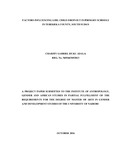| dc.description.abstract | This research project sought to investigate the effect of early marriage on girl child
school drop-out in primary schools in Terekeka County of South Sudan. Early marriage is
one of the leading causes of girl child school drop-out; it contributes to about 45.7% of
the cases. The community of Terekeka value and widely practise early marriage which
interrupts and denies girls education and prevents them to rise to their full potentials in
order to participate in the development of their community in particular and the Country
at large. Economic factor is the other major cause for girl‟s school drop-out where most
parents cannot afford to pay school fees due to poverty. From the study poverty is one of
the leading causes of girl child school drop-out. Most Parents and Guardians are poor and
cannot afford to provide food to their families due to financial constraints not to talk
about ability to pay school fees and provide other school necessities. Whereas, in
accordance with basic rights, a child should not be deprived of learning simply because
she lacks school fees. Due to poverty, early marriage has become rampant in the
community through forceful practice so as to get bride price being viewed as one way to
get out of poverty without minding about the education of their daughters. Furthermore,
the prevalence of civil unrest and insecurity in the country has also destabilized learning
in schools which has further caused school drop-outs. Due to insecurity in the County,
school going children are at high risk of victimization, violence, abuse as they move long
distances to their schools, this created fear in parents and forced them to restrict their
daughters from going to school. Therefore if the aforementioned issues are not addressed,
generations in the Terekeka community in particular and the Country at large will be
deprived of learning and consequently not participate in the socio-economic and political
development arena and the community will not be ready to break out of the hover of
poverty. The data were analyzed into frequencies and percentages using simple statistical
techniques. They were presented in tables and used to explain the influences, factors of
early marriage, and economic factors such as poverty and civil strife which contributed to
insecurity in the county. The study also used both library and study findings. A sample of
70 girls was randomly selected in Terekeka County where the study covers three
localities of three areas of Lingkango, Wasat and Wehida. A number of Focus Group
Discussions were conducted among the community; four key informant interviews were
carried out and one narrative was conducted. | en_US |



